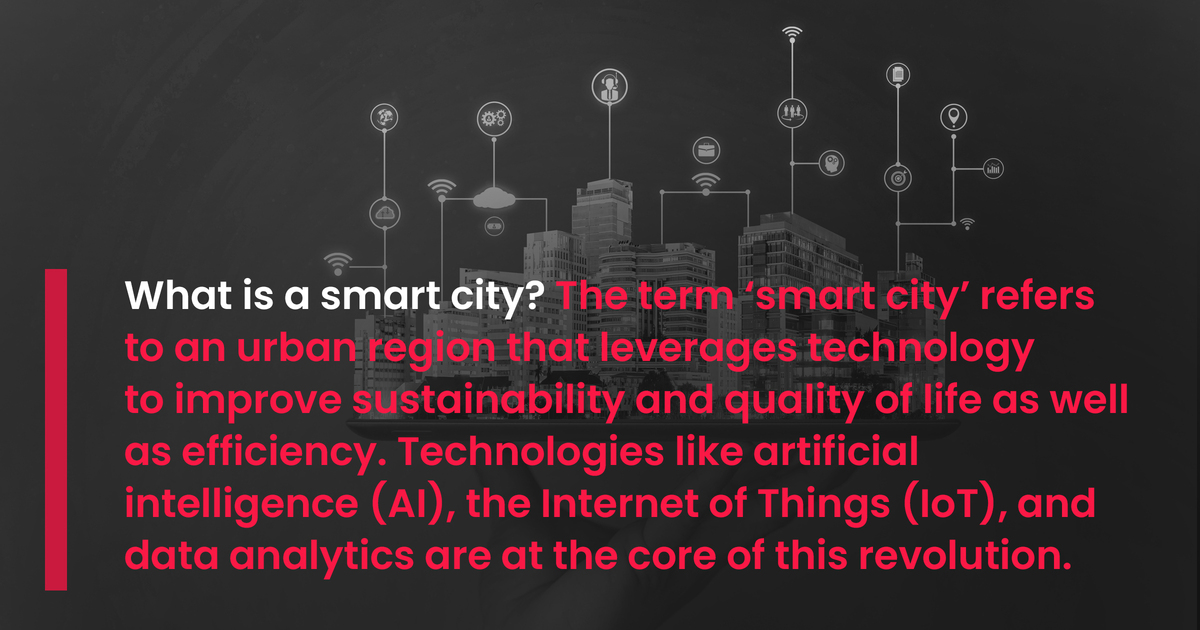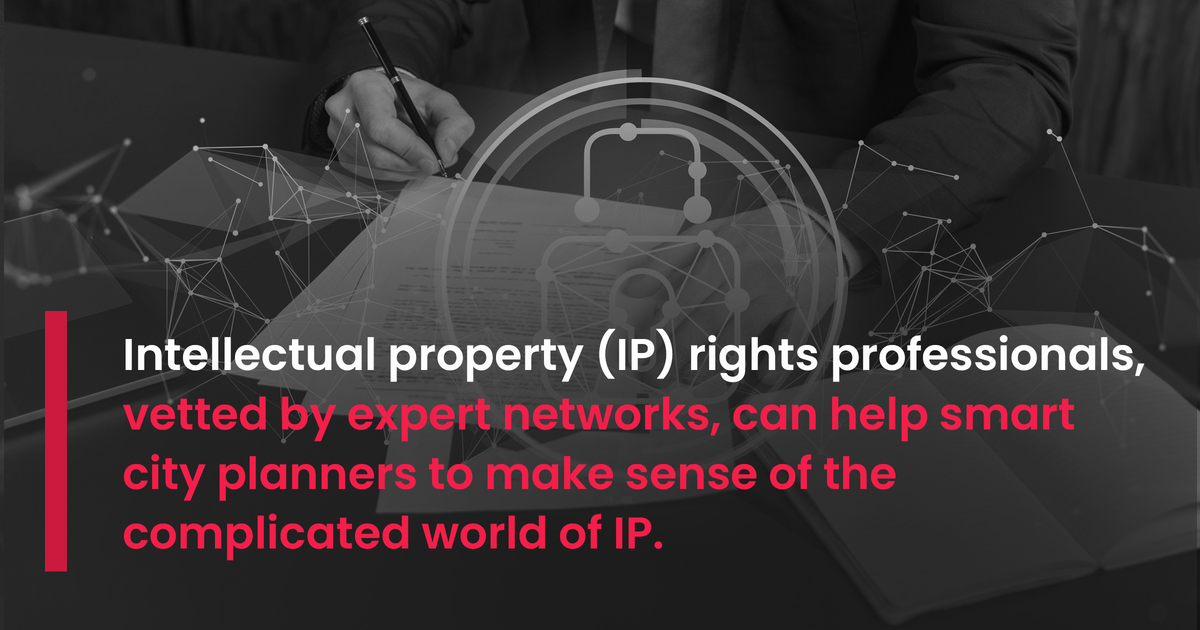Perceived to be like an oasis in a desert, smart cities are the result of a dramatic change in the ever-evolving field of urban development. With the help of cutting-edge technologies and artificial intelligence, living in these cities is becoming a disruptive experience sought by many. This makes the concept a profitable market for businesses but also a challenge for administrations and investors.
Did you know that around 57% of people on Earth (over 4.5 billion) live in cities, and the degree of urbanization is constantly growing? By 2050, the proportion of urban residents is expected to hit 68% of our planet’s population. No wonder that an increasing number of cities today are embracing the smart city concept to be able to satisfy, and manage, an increasing number of residents.
When considering the smart cities market, experts’ forecasts show that this will reach US$820 billion in just a couple of years.
With this in mind, the evolution of smart cities is just a matter of time and, in view of the disruptive technologies applied in urban development and the limited number of professionals aware and involved in the processes, Expert Networks will play a significant role in determining whether this evolution will take a longer or shorter time. Let’s dive in further and explore this topic.
What is a smart city?
 A smart city’s objective is to increase its appeal to businesses and/or residents by introducing and/or improving city services.
A smart city’s objective is to increase its appeal to businesses and/or residents by introducing and/or improving city services.
By 2025 there will be over 30 billion IoT-connected devices in use worldwide, making this a vital component of smart city infrastructure.
In addition, AI is changing the way that city systems operate, from energy distribution to traffic management. However, putting these technologies into practice is anything but easy; it calls for a combination of technical know-how, policy knowledge, skills and expertise in the industry.
Expert networks are crucial in this situation because they serve as a link between technology and policy, facilitating the efficient implementation of smart city projects by building connections between policymakers, municipal planners and specialist knowledge.
How Can Expert Networks Facilitate the Development of Smart Cities?
These networks, which can connect any organization with seasoned experts and thought leaders from a variety of sectors, provide a wealth of information that is essential to the development of smart cities. Here are some examples of how expert networks can contribute to smart cities:
Bridging the Knowledge Gap
Projects related to smart cities are, by their very nature, rather complicated, requiring careful planning and the latest technology input, and involving a wide range of policy implications. With this in mind expert networks can play a crucial role in bridging the gap between policymakers, technologists, and urban planners.
In addition to sharing best practices and offering strategic guidance to successfully navigate the complexity of urban transformation, they provide insights into the most recent technical breakthroughs by connecting organizations with subject-matter experts.
Technological Integration
The creation of smart cities revolves around the integration of technologies such as IoT, AI, and data analytics. Here, expert networks are essential to guide the selection and application of these technologies.
Professionals recruited by expert networks can offer companies guidance on the latest technological advancements in fields such as big data analytics, AI, and the IoT.
IoT devices, for example, gather data in real-time for effective municipal management. This data is analyzed by AI algorithms which ultimately can improve infrastructure and city services.
New Project Built on Proven Strategies
Expert networks are a great way to exchange insightful information and best practices from around the world. They can allow new projects to build on tried-and-tested methods by offering case studies, success stories, and lessons learned from completed smart city projects.
Funding and Risk Management
Finance experts can offer guidance on investment plans, financing schemes, and the viability of smart city initiatives. In addition, risk management experts can help identify any risks—such as financial, operational, and technological—associated with smart city projects and design plans to reduce them.
Sustainable Development
Environmental sustainability is one of the main goals of smart cities and, with their large pool of specialists, expert networks can offer guidance on the integration of sustainable practices into waste management, renewable energy use, urban planning, and carbon footprint reduction.
Policy Development, Intellectual Property, and Patents
In many cases, smart city development requires collaboration among a variety of stakeholders, including private companies, academic institutions, and government agencies. Expert networks can therefore help introduce professionals who are able to help design governance frameworks and policies that support the growth of smart cities.
CASE STUDY. Singapore: The Smartest City in the World
Singapore is a great example of urban innovation, being widely recognized as one of the world’s most outstanding smart cities due to its all-encompassing approach to development. By employing cutting-edge technologies, its administration has managed to improve several facets of urban living, including transport and energy management, as well as minimizing waste and increasing public safety.
Smart City Features in Singapore
- Transport
Singapore’s advanced public transport system, including buses, trains, and taxis, is integrated through smart ticketing systems such as the EZ-Link card.
With 140 stations and more than 200 kilometers of track, the city’s Mass Rapid Transit (MRT) system transports over 3 million passengers every day, making it one of the biggest in the world. Overcrowding is decreased by a number of integrated technologies including real-time information displays and automated train control.
Singapore Mass Rapid Transit System
- Energy
Singapore is renowned for its energy-efficient structures. Moreover, the city-state plans to become 80% green by 2030. New energy-efficient buildings reflect smart business decisions, saving operational costs.
The Marina Bay Sands complex, for example, uses rainwater harvesting, energy-efficient lighting, and waste heat recycling to heat swimming pools.
- Waste Management
Singapore is using cutting-edge technology for waste management. For example, it has built the Tuas South Incineration Plant, one of the biggest waste-to-energy facilities in the world. With the help of this innovative approach, the plant manages to reduce waste by 90% and produce enough power to bring electricity to more than 60,000 homes.
Final word
Whatever the challenges, smart cities definitely have a future and it looks rather bright, especially considering the fact that humanity is moving more quickly towards sustainable urban environments.
In view of this, expert networks such as RightAngle Global will continue to play an important role in helping smart cities to evolve, ensuring experts avoid various obstacles, and bringing more smart ideas to life. To benefit from the best-suited subject-matter experts who are able to give you an edge, feel free to contact RightAngle Global and let us help to increase your value.
Suggested reading:
Data Science Evolves Rapidly. What Are the Five Major Trends for 2024?
How Can Expert Networks Help Make Investing in Environmental, Social, and Governance Easier?
How Expert Networks can help companies to keep up with industry trends
Share to


